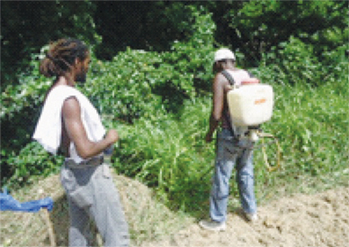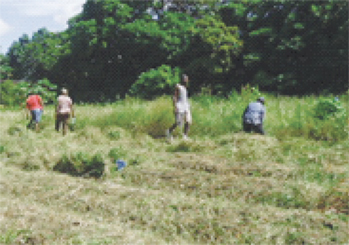
AFTER just three months from its initial launch on 24 September 2014, the Seed Foundation Inc., an NGO, has now provided training to more than 30 farmers from Fond St. Jacques in Soufriere, in organic farming techniques, environmental considerations and health benefits. The project, funded by GEF/UNDP Small Grants Program, includes a series of training sessions using the Farmer
Field School methodology complemented by demonstrations of organic farming activities on selected plots owned by participating farmers supported by technical experts from the Ministry of Agriculture.
The methods used for this sustainable organic farming and food crop production do not require any synthetic agri-chemicals (herbicides, pesticides, fertilizers and plant growth regulators). The organic farming techniques improve the ecology of the farm, capitalize on natural means of fertilization, generation of nutrients, pest control and promote soil conservation. This, in reality, is good agricultural practice in sustainable farming.
Organic farming re-establishes the beneficial flora and fauna, which exist naturally in soil, thereby making it more fertile with a resultant boost in productivity. These practices allow land to produce and remain fertile over continuous cropping cycles, reducing the health risks associated with exposure of consumption to agro-chemical residues, minimizing land degradation by agricultural practices, contributing to environmental sustainability, building resilience in agriculture to climate change and reducing costs associated with farming—allowing for advantages in marketing and income generation. This contrasts significantly with poor agricultural practices, use of agro-chemcials and monoculture intensive farming.

Previously, many farmers had the misconception that organic farming generated lower crop yields, that fruits would be of poor quality, and/or a higher cost of production. The farmers in Soufriere, have been quite surprised to find that this view may not be completely true and that it impedes a better method of a non–chemical farming option. However, the happy marriage of conventional wisdom and rational, modern agricultural technology can bring a sense of optimism and hope to growers, especially for the growing of rain-fed crops.
The influx of exotic pests and diseases has also made conventional crop production very difficult and risky.
Organic farming encourages healthy, agro-ecosystems, which have the ability to adapt to new and emerging environmental challenges. Soufriere is blessed with a very healthy macro and micro flora and fauna. These organisms are an untapped resource that can significantly improve the quality of life on the island. The efficient use of these organisms can significantly reduce the cost of production of many agricultural products. These organisms can also become products themselves, contributing directly and indirectly to the local economy.
In the end, both the financial and ecological environment have greatly benefited.
Note: The SEED Foundation Inc. would like to thank the UNDP-GEF-SGP for the financial and project management support that realized this project as well as the Ministry of Agriculture for their continuous support in project implementation by a team of dedicated experts. As we enter a new year, the project beneficiaries, farmers who are committed to this project, continue to work assiduously in ensuring that all activities for this demonstration project provide an avenue to evolve into a sustainable organic farming programme nationally.




![Simón Bolívar - Liberator of the Americas [Photo credit: Venezuelan Embassy]](https://thevoiceslu.com/wp-content/uploads/2025/12/Simon-Bolivar-feat-2-380x250.jpg)




I am considering moving to St. Lucia, and interested in possibly working on one of the organic farms.
I have been growing produce organically for 12+ years and have a farm stand in my community’s Farmers Market for the past 12 years. I now live in south central Pennsylvania, USA. I would also consider renting a small farm if possible. Thank you for any information on this subject.